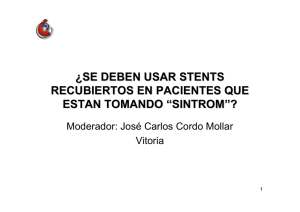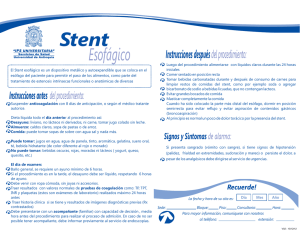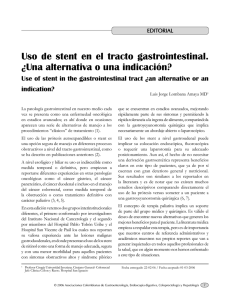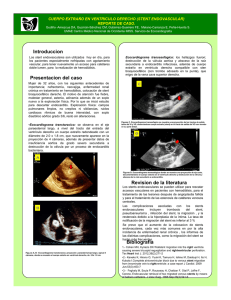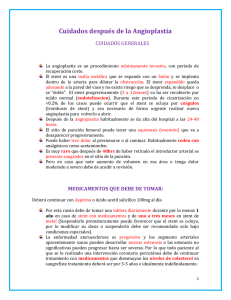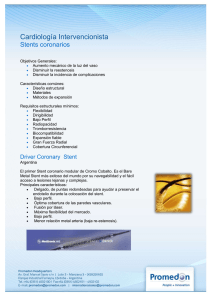tratamiento endovascular de la enfermedad aortoiliaca
Anuncio
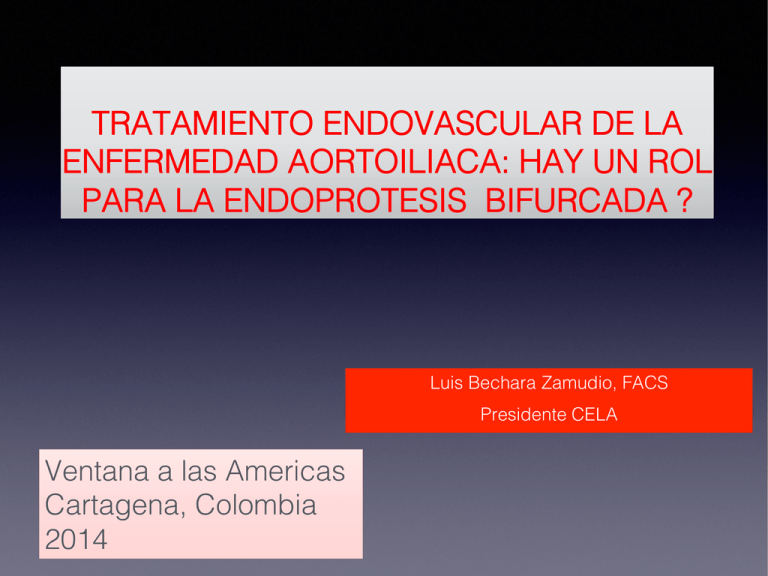
TRATAMIENTO ENDOVASCULAR DE LA ENFERMEDAD AORTOILIACA: HAY UN ROL PARA LA ENDOPROTESIS BIFURCADA ?! Luis Bechara Zamudio, FACS! Presidente CELA! Ventana a las Americas! Cartagena, Colombia! 2014! • MORBID OBESITY • DYALISIS • ADVANCED AGE • SEVERE COPD • CORONARY DISEASE! • 2 • Para EAOI - TASC II C Y D, la CA ha sido considerada como la primera línea en el tratamiento debido a su durabilidad • TEV se usa por su aceptable durabilidad, aunque menor a la CA, y por su menor mortalidad en pacientes de alto riesgo. ! • 2 ! ! Open Surgery! 30 days! 5 years! 10 years! Patency! 87%! Patency AFB Patency IFB Patency AIE 86% 85 % 88 %! Mortality AFB Mortality IFB Mortality AIE! 4% 2.7 % 2.7 %! Morbidity AFB Morbidity IFB Morbidity AIE! 16 % 19 % 12 %! 82%! • de Vries SO, Hunink MG. Results of aortic bifurcation grafts for aortoiliac occlusive dis-ease: a meta- analysis. J Vasc Surg. 1997;26: 558–569 • Chiu KW, Davies RS, Nightingale PG, et al. Review of direct anatomical open surgical management of atherosclerotic aorto- iliac oc-clusive disease. Eur J Vasc Endovasc Surg. 2010;39:460–471 • Jeffrey E. Indes, Miles J. Pfaff, Forough Farrokhyar, Hillary Brown, Peter Hashim, Kevin Cheung, Julie Ann Sosa: Clinical Outcomes of 5358 Patients Undergoing Direct Open Bypass or Endovascular Treatment for Aortoiliac Occlusive Disease: A Systematic Review and Meta-Analysis. J Endovasc Ther. 2013;20:443–455 ! ! 3 • CA vs TEV! OS! EVT! 13! 4! 2.6 %! 0.7 %! Morbilidad ! 18%! 13%! Permeabil 1ria 5 a Permeabil 2ria! 82% 91 %! 71% 82.5 %! 17.000! 13.500! Estadía hospital ! Mortalidad ! Costo Hospital dol! " " " Jeffrey E. Indes, Miles J. Pfaff, Forough Farrokhyar, Hillary Brown, Peter Hashim, Kevin Cheung, Julie Ann Sosa: Clinical Outcomes of 5358 Patients Undergoing Direct Open Bypass or Endovascular Treatment for Aortoiliac Occlusive Disease: A Systematic Review and Meta-Analysis. J Endovasc Ther. 2013;20:443–455 Vincent Jongkind, MD,a,b George J. M. Akkersdijk, MD,a Kak K. Yeung, MSc,b and Willem Wisselink: A systematic review of endovascular treatment of extensive aortoiliac occlusive disease. J Vasc Surg 2010;52:1376-83 Jeffrey E. Indes, Anant Mandawat, Charles T. Tuggle, Bart Muhs, Julie A. Sosa: Endovascular procedures for aorto-iliac occlusive disease are associated with superior shortterm clinical and economic outcomes compared with open surgery in the inpatient population. J Vasc Surg 2010;52:1173-9. ! • 4 ! ! • Stent Primario o Selectivo 1y 3 y! 5 y! 10 y! 1ry Pat A/B Pat C/D! 95 % 91 %! 91 % 88 %! 88 % 83 %! 83 % 71 %! Selective Stent! 83%! 1ry Stent! 92%! PATENCY Shigeo Ichihashi: J Vasc Surg 2011;53:992-9! Wei Ye: J Vasc Surg 2011; 53:1728-37! Klein WM: Radiology 2006; 238:734! Balzer JO: Eur Radiol 2006;16:124-31 ! Estos resultados contrastan con el Dutch randomized trial que mostró resultados comparables a dos años entre stent primario y selectivo." " El stent primario colocado sin predilatacion, reduce el riesgo de ruptura y de embolia distal.! " ! CA vs Híbrida (Stent Iliaco + AFC-E) Michele Piazza, Joseph J. Ricotta II, Thomas C. Bower, Manju Kalra, Audra A. Duncan, Stephen Cha, Peter Gloviczki: Iliac agrtery stenting combined with open femoral endarterectomy is as effective as open surgical reconstruction for severe iliac and common femoral occlusive disease. J Vasc Surg 2011;54:402-11. ! CA! HIBRI! 30 d Mortalidad ! 1.4 %! 1.1 %! 30 d Morbilidad ! 3%! 5%! 97%! 91%! Permeabilidad 1ria 3 a! • COBEST Trial! Ø Ø Ø Ø Covered Versus Balloon Expandable Stent Trial (COBEST): fue un estudio prospectivo y multicentrico, que comparó el uso del stent cubierto balón expandible Advanta V12 con otros stents descubiertos en 8 centros de Australia. Los stents cubiertos pueden excluir placa y endotelio, pudiendo mitigar la hiperplasia miointimal. La reestenosis observada en el grupo de stent cubierto fue predominantemente en los extremos del stent. Conclusión: Para pacientes con EAOI severa, hay una disminución de la reestenosis y oclusión con stent cubierto comparado con stent descubierto a los 12 y 18 meses.! • 7 ! Cerca del nacimiento de la AII, la AIC acompaña los movimientos de la cadera sobre el raquis, con posibilidad de ruptura o perforaciones.! FP STENT EN PELVIS Sacks BA. J Vasc Interv Radiol 1996;7:53-5 Higashiura W. J Vasc Surg 2009;49:645-52 • KISSING STENT! 3 y Patency 1ry and 2ry! KissingSt! 5 y Patency 1ry and 2ry! 10 y Patency 1ry and 2ry! 85 - 89 %! 70 - 85 %! 83 - 95 %! OS! • K. Björses, K. Ivancev, L. Riva, J. Manjer, P. Uher, T. Resch: Kissingstents in the Aortic Bifurcation is a Valid Reconstruction for Aorto-iliac Occlusive Disease. Eur J Vasc Endovasc Surg (2008) 36, 424e431 ! • 7 9 ! " Outcomes are similar for patients with CIA or EIA stents and for those with combined ipsilateral CIA and EIA stents. Rachel C. Danczyk, Erica L. Mitchell, Chad Burk, Sarguni Singh, Timothy K. Liem, Gregory J. Landry, Bryan D. Petersen, Gregory L. M: Comparing patient outcomes between multiple ipsilateral iliac artery stents and isolated iliac artery stents. J Vasc Surg 2012;55:1637-46. " None of this other studies found a significant difference between localized vs extensive aortoiliac disease (>10 cm). Bjorses K, Ivancev K, Riva L, Manjer J, Uher P, Resch T. Kissing stents in the aortic bifurcation–a valid reconstruction for aorto-iliac occlusive disease. Eur J Vasc Endovasc Surg 2008;36:424-31.; De Roeck A, Hendriks JM, Delrue F, Lauwers P, Van Schil P, De Maeseneer M, et al. Long-term results of primary stenting for long and complex iliac artery occlusions. Acta Chir Belg 2006;106:187-92; Kashyap VS, Pavkov ML, Bena JF, Sarac TP, O'Hara PJ, Lyden SP, et al. The management of severe aortoiliac occlusive disease: endovascular therapy rivals open reconstruction. J Vasc Surg 2008;48:1451; Sixt S, Alawied AK, Rastan A, Schwarzwalder U, Kleim M, Noory E, et al. Acute and long-term outcome of endovascular therapy for aortoiliac occlusive lesions stratified according to the TASC classification: a single-center experience. J Endovasc Ther 2008;15:408; Sharafuddin MJ, Hoballah JJ, Kresowik TF, Sharp WJ, Golzarian J, Sun S, et al. Long-term outcome following stent reconstruction of the aortic bifurcation and the role of geometric determinants. Ann Vasc Surg 2008;22:346-57 11! 12 En este caso, una oclusión bilateral de ambas arterias iliacas fue tratada con recanalización retrógrada con técnica de kissing stent cubierto.! Una oclusión total de aorta fue tratada con 2 stent cubiertos en la AIC izquierda, ya que la oclusión derecha era crónica y asintomática en un hombre de 85 años! 14 16! 17! Conclusiones ! Ø Las endoprotesis actuales están diseñadas para el tratamiento de AAA! Ø En algunos casos tratamos aortas degenerativas con ellas! Ø Las EAOI requieren otros tipos de endoprotesis! Ø Al momento, el stent cubierto es lo mejor para el tratamiento de la EAOI.!
